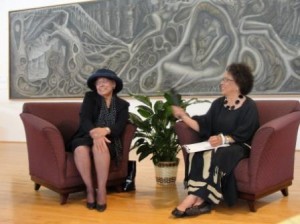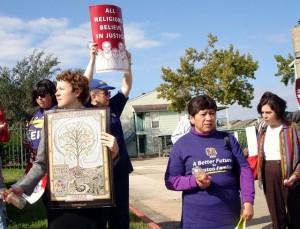By Arthur Shaw
QUESTION: And also, in Venezuela. Venezuela and Russia – there is this thing that they want to buy and the Russians apparently want to sell them about $5 billion worth of weapons. Have you anything on this? Do you consider this a threat? Do you know which kind of weapons?
MR. CROWLEY: Well, what relationships governments have is up to them. What they do in those relationships is, again, a matter of a bilateral issue between Venezuela and Russia. We don’t care. On the other hand, to the extent that Venezuela is purchasing military equipment, we’re hard-pressed to see what legitimate defense needs Venezuela has for this equipment. Our primary concern is not – if Venezuela wants to acquire these – this equipment, we can probably think of better things that could be invested on behalf of the Venezuelan people. But our primary concern is that – that if Venezuela is going to increase its military hardware, we certainly don’t want to see this hardware migrate into other parts of the hemisphere. And we would simply remind Venezuela that through a number of accords has responsibility for transparency in its acquisitions and must make clear about the purpose of acquiring these materials.
Two days later, April 7, Venezuela’s President Hugo Chavez described the concerns of the bourgeois and imperialist regime in Washington, over arms deals between Venezuela and Russia, as cynical. Chavez pointed out that the imperialist regime under Obama is fueling the military build-up in Latin America and the Caribbean.
“They are so cynical that they criticize us just because we are trying to strengthen our defense,” Chavez said.
US imperialists spend more on arms than all of the other countries of the world combined. They have over 800 military bases scattered all over the globe which threaten all peoples of the world, including Venezuelans. The runaway military spending of the imperialist US regime has helped to bankrupt the regime, plunging the desperate regime into trillions and trillions of dollars of debt. The ongoing aggressions and occupations by the armed forces of the imperialist regime in DC are exterminating human beings at monstrous rate … 2,000,000 war-related fatalities in seven years so far in Iraq demonstrated by a series of scientific mortality studies, an estimated 5,000,000 war-related fatalities in Afghanistan in nine years, and the fatalities in Pakistan are approaching the magnitude of the Iraqi and Afghan numbers, 30,000 occupation-related fatalities in the two year occupation of Haiti between 2004-2006 that was supervised by the Bush regime. As pretexts for its aggressions against other countries, the imperialist regime resorts to lies, facts, and everything between lies and facts. The imperialist regime in the USA deploys huge non-combat private armies of US mercenaries … 110,000 mercenaries in Iraq … which conduct genocide or mass extermination operations against civilians of countries occupied by US imperialists. The savage regime of US imperialists operates a international network of 70 concentration camps that holds over 500,000 political prisoners, often kidnapped or “rendered” and often tortured or subjected to “enhanced interrogation” before many of them are murdered or “executed or neutralized extra judicially.”
Most of these atrocities or these massive violations of human rights, the US imperialists openly boast about and they argue that their regime has to do these terrible things in order to win the so-called war on terrorism. This is the same argument that Hitler and Pol Pot made.
Like Hitler and Pol Pot, the imperialist regime in Washington is itself the main terrorist.
With this rogue regime in Washington on the loose in the world, the rogue says “We’re hard-pressed to see what legitimate defense needs Venezuela has for this equipment” which Venezuela buys from Russia to defend itself. Clearly, the Obama regime believes that the needs of a country to defend itself from US imperialist aggression, occupation, and genocide is not legitimate.
“We are threatened by the empire,” Hugo Chavez said on April 7.
Why are US imperialists “hard-pressed” to see what are Venezuela’s “legitimate defend needs” given the imperial threat aimed at Venezuela? The only way US imperialists could be “hard-pressed” to see Venezuela’s legitimate defense needs is the imperialists close their eyes to Venezuela’s legitimate defense needs. When one closes one’s eyes, one is “hard-pressed” to see anything. Using its quislings in Venezuela, US imperialism in April 2002 tried to overthrow democracy in Venezuela and set up a brutal bourgeois dictatorship that was friendly to US imperialists. No doubt, the US imperialists are “hard-pressed” to see anything wrong in this 2002 aggression against the Venezuelan people. In 2009, the US imperialists announced they were increasing the number of US military bases in Colombia, a country that borders Venezuela on the west, from three to ten and expanding the size and capabilities of all 10 US military bases in Colombia. No doubt, these US imperialists are “hard-pressed” to see that their military expansionism poses a threat to Venezuela and all of Latin America.
Naturally, US imperialists deny that they were behind the 2002 attempt to overthrow the democratic government of Venezuela. But US imperialists always lie when they are asked to admit their culpability in these things. So, their denials should never be believed, unless confirmed by independent sources. No such sources have so far confirmed the imperial denial.
Among the main threats to Venezuela mentioned by Chavez are US military bases in Colombia, Panama and the Netherlands Antilles, as well as the reactivation of the 4th US Fleet in the Caribbean.
Compared to the huge US imperial military presence in the Caribbean, Russia’s recent arm sales to Venezuela are miniscule.
Russia has sold to Venezuela MI Helicopters, Sukhoi aircrafts and AKM rifles, and Venezuela is expecting the arrival of anti-aircraft tanks and shoulder-fired SAM missiles that utilize cutting-edge technology.
By the way, what “legitimate defense needs” do the US imperialists have for their current huge military presence in the Caribbean?
I am “hard-pressed” to see any legitimate defense needs of the imperialist regime in Washington that are served by its 13 US military bases in Latin America and the Caribbean.
We know that about one third of the US people … the reactionaries or the conservatives … are delighted by the imperial bestiality exhibited by two Bush regimes and the Clinton and Obama regimes. Most of the highly-paid US mercenaries who are skilled in genocide come out of this reactionary sector of the US people. These animals are eager to do genocide on the Venezuelan people or any other people, including their own people in the USA.
Another third of the US people … so-called independents who occupy ideological and political space between the reactionaries and liberals … are more or less disposed against the adventures of US imperialists, but they are not disposed very strongly. The idea of another US imperialist attack on Venezuela appals them, but they are not prepared to fight to prevent another US imperialist attack on Venezuela.
The remaining third of the US people … the liberals … are disposed against the adventures of US imperialist predators against other countries, including Venezuela, and are fighting to prevent such attacks. So, the basic issue is whether the liberal or the reactionaries will win over the independents.
The de-composition that is the imperialist sector of the US bourgeoisie says it speaks for the US people, but in reality they speak only for the reactionary sector of the US people, a mass of animals.
The majority of the US people opposes the adventures of US imperialists and this majority is rather consistent in expressing their opposition when they vote or otherwise express themselves.
The problem is the US imperialists pay little or no attention to the majority of the US people.













